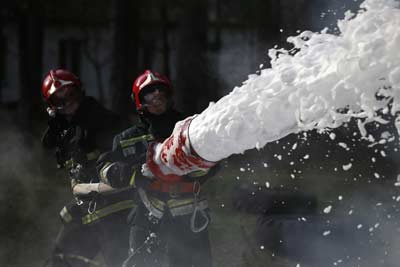Common Water Contamination Lawsuit Questions and Answers for Seattle Residents

This page contains answers to common water contamination lawsuit questions that apply to most Seattle PFAS water claims for testicular cancer, kidney cancer, liver cancer and pancreatic cancer. To discuss your case in detail or ask specific questions related to your circumstances, contact our firm. Our team of attorneys handling drinking water lawsuit claims for Seattle residents provides free, no obligation case review. Simply contact our firm and one of our experienced lawyers handling PFAS cancer lawsuit claims for testicular cancer, kidney cancer, liver cancer and pancreatic cancer in Seattle will contact you in the near future to answer your questions, completely free of charge.
Who can make a water contamination claim in Seattle or file a PFAS cancer lawsuit?
Any person or family member of a person who has been diagnosed with PFAS health problems such as cancer and has a history of exposure to PFAS chemicals in their drinking water in Seattle may be eligible to make a claim by filing a drinking water lawsuit against the federal government.
Which kinds of cancer qualify for drinking water claims in Seattle?
At this time, our attorneys are accepting cases related to testicular cancer, kidney cancer, liver cancer and pancreatic cancer from exposure to Seattle PFAS forever chemicals.
Does it cost anything for you to review my case?
We will always listen to your circumstances and give you our analysis of your case without any cost or further obligation.
How do PFAS chemicals get into groundwater and drinking water in Seattle?
There are many different sources, but one that is common in Seattle and throughout the United States is fire-fighting foam containing PFAS which is used on military bases and at airports. Fire-fighting foam represented a technological leap when it was invented in the 1960s. In aircraft crashes, this technology extinguishes fires quickly and prevents explosions. The foam has been sprayed prolifically in both emergency settings and in training sessions in Seattle. After the incident or scenario, the foam is sprayed off the airplane and runway, soaking into the land. Underground, the PFAS chemicals enter Seattle groundwater and can travel short or long distances, and may contaminate drinking water sources in Seattle.

How long has the military known about the dangers posed by the chemicals in PFAS fire fighting foam?
Fire-fighting foam containing PFAS chemicals was developed in the 1960s by the federal government and the military. In 1969, PFAS fire fighting foam became standard across emergency response and training throughout the military. In the 1970s, Navy and the federal government scientists warned of the dangers of PFAS chemicals in fire-fighting foam, yet its risks to human health were not acknowledged by the government for decades to come. Finally, in 2020, fire-fighting foam containing the known carcinogens PFOS and PFOA was phased out of use. These chemicals have been replaced by other PFAS chemicals, which some scientists say may be even more dangerous to humans.
Locations in Washington with contaminated drinking water:
- Naval Base Kitsap - Bangor (replacing Bremerton WA Navbase), Silverdale
- JB Lewis McChord - Yakima Training Center, Tacoma
- Salem Anderson Readiness Center, Salem
- Montesano Armory, Grays Harbor County
- Camp Rilea, Clatsop County
- Ault Field (Naval Air Station Whidbey Island), Oak Harbor
- Fairchild Air Force Base, Fairchild
- Joint Base Lewis-McChord - Lewis, McChord AFB
- KEYPORT WA NUWC DIV, Keyport
Who is most at risk for developing cancer from PFAS exposure in Seattle?
PFAS chemicals have been found to bioaccumulate, or build up in the body, over time. While relatively small exposures to PFAS forever chemicals can cause harm, the risk is thought to increase with higher levels of exposure. Persons in Seattle who have been exposed to contaminated drinking water for a long period of time, or whose drinking water is highly contaminated, may be at the highest risk for developing cancer.
What does it cost to file a water contamination lawsuit for cancer in Seattle?
We are committed to representing all Seattle persons involved in a drinking water lawsuit on a contingency basis, meaning there are never any legal fees unless we win compensation in your case. To access your free, no-obligation consultation, use the online chat feature or contact form on this site. One of our lawyers handling PFAS water contamination lawsuits for Seattle cancer will contact you to answer any of your questions.
How do I know if there are PFAS chemicals in my Seattle drinking water?
If you live near an airport or military base, there is a good chance you have been exposed to PFAS substances in your drinking water. Because PFAS chemicals have entered the groundwater, both municipal and domestic water sources (wells) have been affected. Many communities now test for PFAS content in water and make the results publicly available.
Aren't most drug and products liability lawsuits just class action lawsuits where the plaintiff receives very little money?
PFAS drinking water lawsuit claims for cancer from Seattle are likely to be consolidated with others from around the nation as MDL, or Multi-District Litigation, where each plaintiff receives a settlement based upon the individual injuries and damages incurred by each plaintiff. This process increases the efficiency of processing vast numbers of cases all related to one common harm.
How much time do I have to file a drinking water lawsuit in Seattle?
Most states have PFAS drinking water lawsuit time limits; however, the majority of all persons having developed cancer from PFAS drinking water exposure in Seattle will fall within those time limits if they contact an attorney in the near future. For specific time limits for your Seattle PFAS drinking water claim, please fill out the form at right and one of our attorneys will contact you as quickly as possible, usually within the hour.
We're not the type of people who sue; do we really need to file a lawsuit?
If a member of your family suffered a serious injury or health problem as a result of a dangerous product or drug, long-term, or even lifelong, medical care may be required. This could be incredibly expensive and since medical costs are continually rising may be largely unknown at the time of settlement or trial. If a member of your family died due to a defective product or dangerous drug, no amount of money can undo that wrong. It is our fervent hope that every lawsuit we file can serve to make the parties responsible take note of the loss and pain their actions have caused. When that fails to lead to a safer world, we rely on the threat of large settlements to make them do the right thing. Unfortunately, in all too many cases it is only the fear of lawsuits and large settlements and verdicts that results in lasting change.
